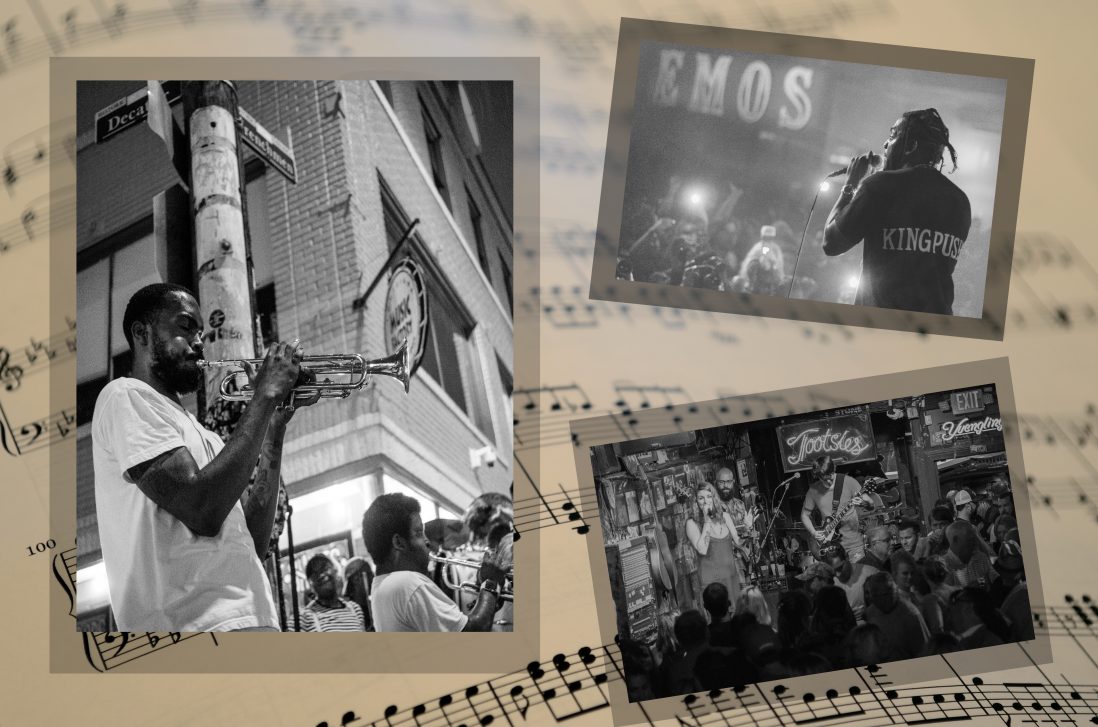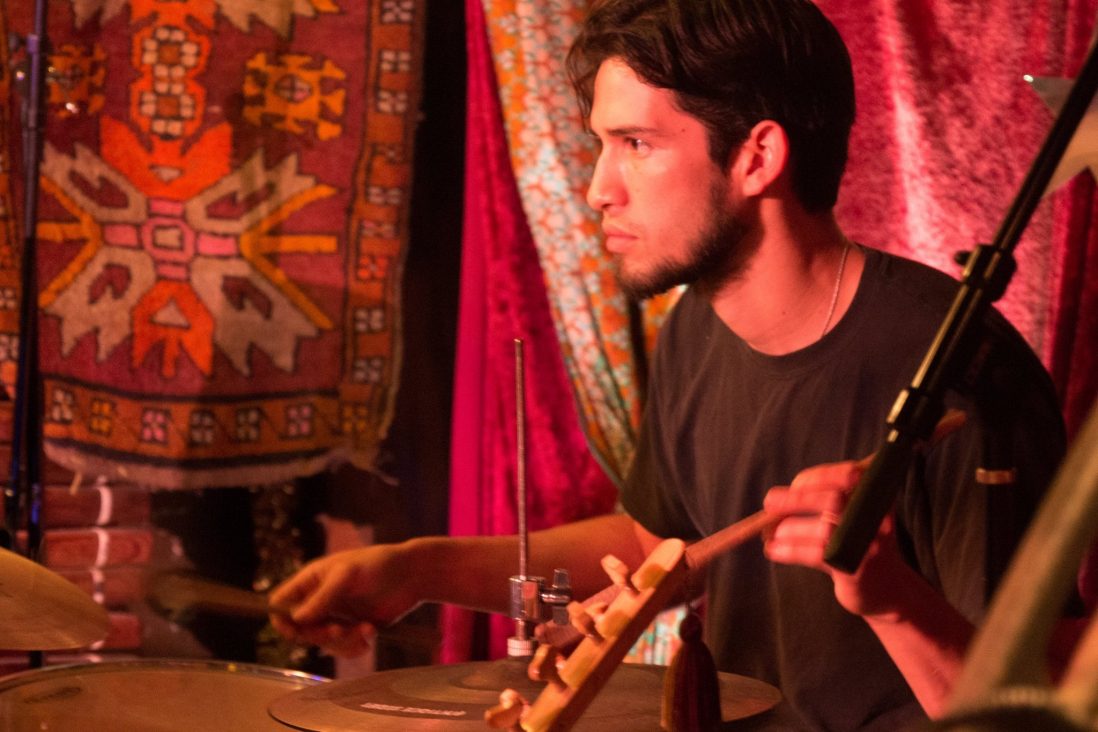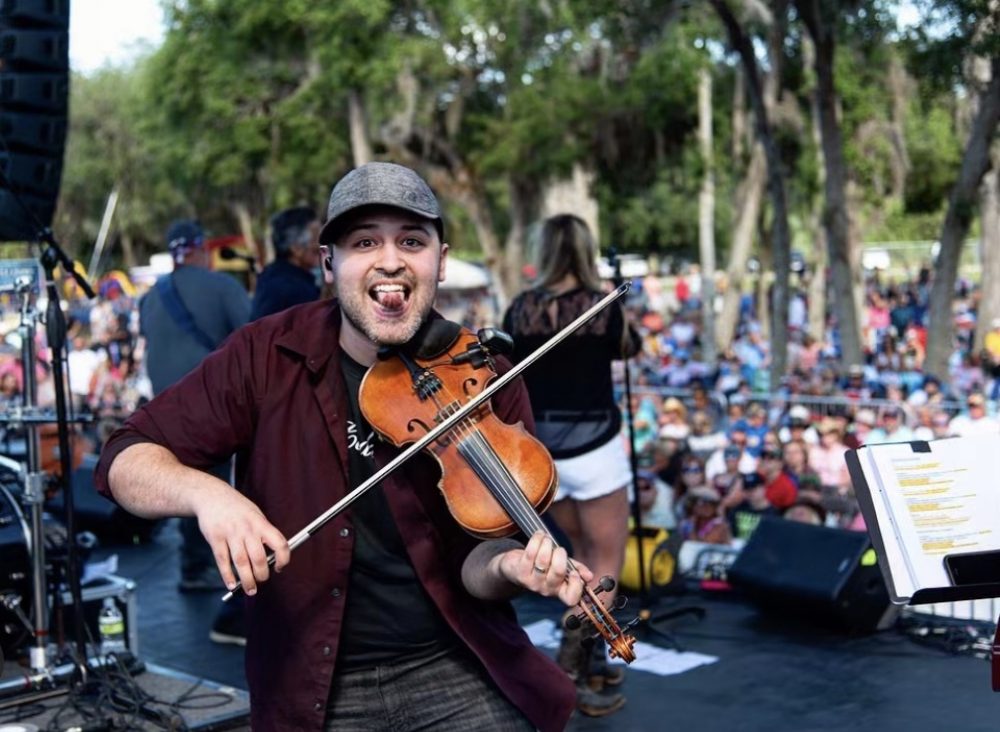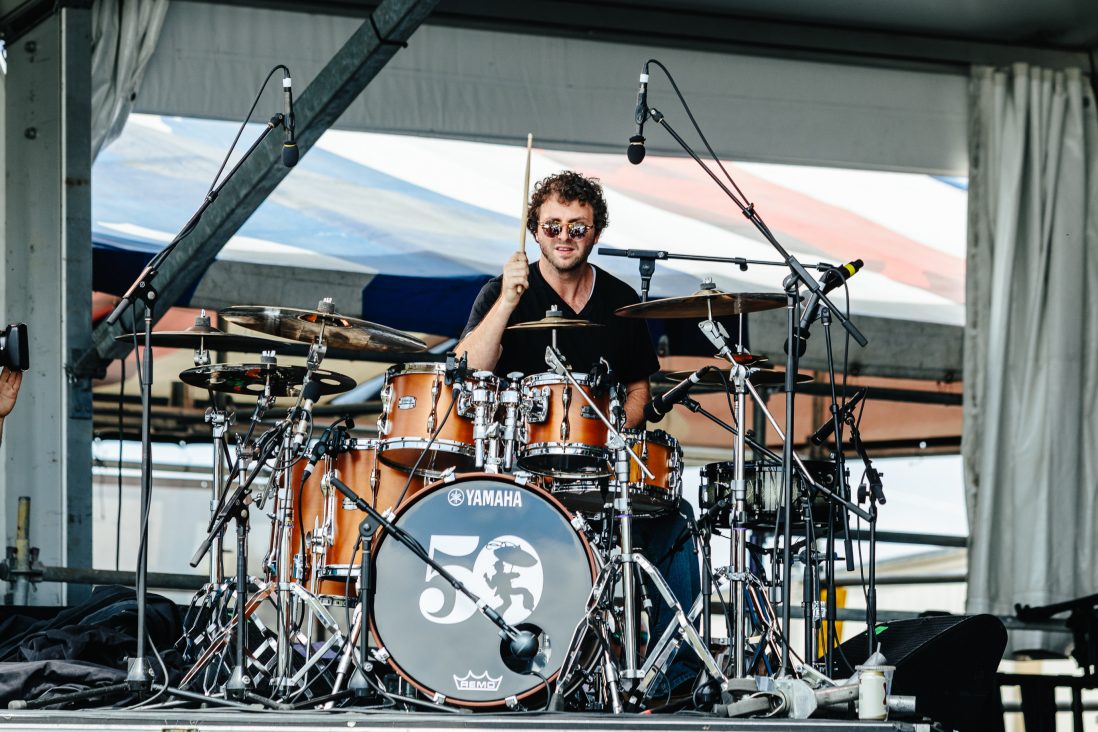The day the music stopped
The day the music stopped

Musicians across the U.S. have been hit hard by the coronavirus. But arguably the greatest impact has been on local musicians in the nation’s three live music capitals: Austin, Nashville, and New Orleans, where music is the lifeblood of their communities. These cities are not like New York or Los Angeles, where music is one relatively small piece of the economic pie. It is practically the entire pie.
Every aspect of these cities’ entertainment landscape has been affected. From nightclub bouncers and bartenders to gigging musicians and festival coordinators, the three cities may be facing devastating long-term economic impacts.
In these cities, music is akin to the auto industry in Detroit; it’s absolutely invaluable. A 2016 economic impact study found that during that year, musicians in New Orleans played 31,000 gigs and contributed $904 million to the city. A similar study from 2013 found that in Nashville, an estimated 56,000 jobs and $5.5 billion contributed to the local economy, and in 2014, Austin’s music and music tourism was a $1.8 billion industry.
But with restaurants and bars closed and concerts and music festivals either canceled or postponed, the pool of wealth has dried up, as working musicians are left with no gigs to play for the foreseeable future and untold thousands of dollars of lost income. According to ZipRecruiter, the average annual income for musicians is less than $40,000, so a loss of even just $5,000 is crippling. More than that can be devastating.
With the coronavirus showing no signs of slowing down as the prosperous summer gigging season approaches, three musicians (one from each affected city) share how they’ve been affected by the pandemic.
Austin: “Oh, f—, what are we going to do? This is our Christmas.”
Stefan Castro-Del-Bosque, a drummer and audio engineer in Austin, was supposed to play two performances and do stagehand and audio production work at SXSW. When the music/film/tech festival was canceled, he was hit hard. He estimates he’s already lost at least $2,000 due to the pandemic but that number is quickly growing. He says audio production workers missed out on at least $3,000 to $5,000 in earnings from SXSW alone, not counting the income generated from playing bars and restaurants.
“It’s like, Oh, f—, what are we going to do? This is our Christmas, we’re banking on this. Everybody was banking on this,” Castro-Del-Bosque says. “Austin, like New Orleans or Nashville, is full of artists. Full of people that a lot of their income is generated through what they do musically. To have that pulled out from underneath us within a week of [the] festival was crazy devastating.”
His livelihood goes far beyond SXSW, however. The 32-year-old says most musicians can’t afford to miss the income from gigs. Even worse, if social distancing extends into the summer months, Castro-Del-Bosque fears musicians will miss out on wedding and private-sector gigs, which are some of the highest paying gigs of the year, he says.

Castro-Del-Bosque also relies on lessons as a part of his income but as the pandemic has worsened, he’s only teaching one of his five regular students virtually. At $80 a lesson, that’s $320 of missed income a week.
To make up some of their missed income, Castro-Del-Bosque and his girlfriend, who is also a musician, have turned to live streaming performances from their home with the hopes that viewers will donate to them on Venmo. But a one-hour livestream is only earning them between $20 and $40. Castro-Del-Bosque also works for Favor Delivery (an Austin-only delivery app) allowing him to continue making some money, but not anywhere close to his income from gigging.
In an effort to offset some of the financial losses by SXSW’s cancelation, the Austin Community Foundation, in partnership with the Entrepreneurs Foundation, started the Stand with Austin Fund, which, at press time, has already raised $400,000. The organization is working with an advisory committee with representatives from the industries affected and will grant the money to non-profits which will then distribute the money to those in need. The application process opened on March 26 and will close on April 17.
It also recently partnered with the United Way for Greater Austin to create the All Together ATX Fund, aimed at providing economic assistance to those hardest hit by the pandemic. When this article was written, it had raised $40,000 in donations, but the Austin Community Foundation has seeded the fund with $250,000, and contributions from donor advised fund holders are currently at $230,000, bringing the total amount to about $480,000.
Castro-Del-Bosque says the community support has been reassuring, but he hopes that once the pandemic is over there is a serious conversation about providing governmental assistance to musicians.
“After this is all said and done, I would like to see the government value it’s arts more,” Castro-Del-Bosque says. “[It] can at least try to create some rent control in the entertainment districts, because it’s hurting real bad. But even before this, it was already not great, so if [coronavirus] is what it takes to save the art scene, so be it. But only if we actually learned something.”
Nashville: “I thought I could escape this”
Four or five nights a week, Johnny Warren packs up his fiddle and makes the 30-minute drive from his house to downtown Nashville for gigs along the Broadway strip. They’re usually four-hour hits and, depending on tips, he can make anywhere from $150 to $300.
But these days the strip is empty. And Warren is stuck at home with a growing list of canceled gigs. “[It] absolutely scares me, terrifies me,” Warren says. “Just in the gigs that have been canceled, definitely canceled, I’m looking at $3,000 to $5,000 worth of loss that I won’t have. And if it goes on for another month, that could be getting into the double digits for me.”
Warren, who is 27, currently lives with his wife, their 16-month-old daughter, and his wife’s grandmother, who helps take care of their daughter. Warren says he’s saved portions of his income from gigs, but only enough to cover a month or so of bills and expenses. His wife is still able to work her full-time job and they have some financial assistance from her grandmother’s retirement fund.

Before the pandemic, Warren was scheduled to perform with fellow Nashville duo Willow Hill on a 10-day gig in the Virgin Islands. But right before his trip, the territory announced its first case of the virus and the duo canceled the tour. “I thought I was going to be able to escape all this,” Warren says, noting a loss of thousands of dollars from the cancellation. “That was going to be 10 days of getting away from this while still being able to do music and making money for my family, knowing that when I came back my Broadway gigs were going to be canceled. So, I was like ‘This is great, I’ll go into this, make the money and save it.’ It was devastating. I was like, ‘Well, even the plan that I had is canceled.’ Every everything is canceled. It’s so frustrating and scary.”
Warren also works as a studio musician and says a third of his income typically comes from artists or producers sending him tracks for him to record violin on at his home studio. But even that has been stymied, as musicians don’t want to leave their quarantines and head to the studios. “Even the stuff that you would think would be still lucrative is not lucrative anymore, because we’re all kind of trapped in our houses,” he says.
Unlike others, he’s not teaching students because he says it’s too hard to convince people to spend their money on lessons rather than necessary supplies. Instead, he’s using the break to work on promotional material and shed new music with the hope that the pandemic will only prevent him from gigging for a month.
“I’ve often thought how great it would be to have some extra time to put some marketing videos out there, whether it’s me playing with people or just producing my own music and putting it out there,” Warren says. “That stuff is not going to necessarily show me a financial return right now, but it could be very good for when this stuff is over.”
New Orleans: “We’re having to carve a new profession for ourselves.”
Sam Shahin was leaving Colorado and headed to St. Louis with his jazz-funk band Naughty Professor when he got the call.
They were supposed to open for renown New Orleans jazz-funksters Galactic on their 25th anniversary tour. But Galactic called their supporting act and told them the tour was canceled due to the Coronavirus. More phone calls followed.
“All of my stuff started getting canceled,” Shahin says. “French Quarter Festival, New Orleans Jazz and Heritage Festival [both have since been rescheduled for the fall]. I was supposed to be in Orlando at Universal Studios doing a couple weeks there for like a brass band, which is usually a high-money gig. That got completely canceled rather than postponed. A lot of the touring dates and festival dates are what got cancelled first for me, which kind of alerted me to the severity of [the pandemic].”
On Monday, reality set in when Shahin (whose father is a professor at Newhouse) was playing what would end up being his final gig on Bourbon Street during the pandemic. Police entered the venue he was performing at and ordered everything to be shut down. With restaurants operating as take-out only until at least March 30, Bourbon Street is now completely empty with no live music scheduled for the foreseeable future.

Coronavirus hit in the middle of what many local musicians regard as the Big Easy’s most fertile season, stretching from Carnival in February through Mardi Gras and St. Patrick’s Day to the big festivals in April and May. Perhaps owing to the flow of people at those gatherings, New Orleans has quickly become a hotspot for the virus, potentially forcing the city’s ban on public gatherings and the closing of restaurants and bars to extend even longer. Shahin anticipates a loss of at least 20 percent of his annual income.
In addition to the festival and tour dates Shahin is missing, the 30-year-old normally plays five nights a week when home in New Orleans, which means he’s missing out on weeks, perhaps months, of income. To counteract some of his losses, he’s started tutoring Chinese students in English through an online program and he’s begun teaching three new students online.
Shahin knows fellow musicians in worse spots than he is and is fearful for the long-term impact it could have on them, especially those who recently moved to the city and have yet to plant their roots. But he says he and other musicians are using this break as an opportunity to reinvent how they make money as the world shifts online. “We’re kind of having to carve a new profession for ourselves out of digital streams,” he says, “out of live streaming small events, out of teaching students and out of any alternative sources of income we can find.”
Shahin says New Orleans has responded well to the coronavirus pandemic. He jokes and says it may have taken the city a little while to “stop partying and get our asses off the streets,” but says the community of musicians has been supportive of one another as the situation has gotten increasingly severe.
“One of the many reasons I love New Orleans is because the community of musicians is so inclusive and positive,” Shahin says, “and we build each other up.”
For musicians and audio technicians living in Austin, March 13 to 22 was supposed to be the most financially stimulating 10 days of the year. But then South by Southwest, commonly just called South by, one of the world’s largest music festivals and creative conferences, was canceled because of the coronavirus.
The festival brings in over $350 million to the city, according to Misty Whited, vice president of marketing and communications at the Austin Community Foundation. “It’s a huge economic engine and it’s basically run by all locals,” Whited says. “The musicians, the bartenders, the Uber drivers, everyone in town either works at South by or leaves town for South by.”
Roland Swenson, SXSW’s co-founder and managing director, said he had to lay off a third of the festival’s staff the week the festival was supposed to happen. He’s tried to stay in survival mode rather than grieving, but it’s been difficult. “It made me feel s—-y,” he says. Additionally, Swenson says the music only makes up 30% of the festival; when thinking about the other factions of SXSW, like film, tech and content creation, as well as all of the local companies that help put on the event, Swenson says the number of people losing money due to SXSW’s cancelation is catastrophic.
“It’s not just the hospitality industry that’s affected by South by Southwest,” Swenson says. “There are all of these small companies that make signs, rent sound systems, tents, you know, just a lot of service businesses that make SXSW their biggest week of the year, so they’ve all lost that. There’s gonna be a lot of businesses that go under.”
Swenson says it’s hard to predict the long-term impacts of SXSW’s cancelation but knows it’s a big hit to the city and that it will play out over the course of the next year. He says he’s doing the best he can to mitigate damages and looks forward toward next year’s festival.
“I’m trying to keep my people employed and just trying to finance the rest of the year.”

This article is part of the Fermata: Arts and Culture in the Time of Coronavirus series reported by students in the Critical Writing course at the Newhouse School. In the coming days, Fermata will feature stories on the impact of the pandemic on a wide range of artists and cultural figures, from musicians and comedians to restaurateurs and boutique owners.







